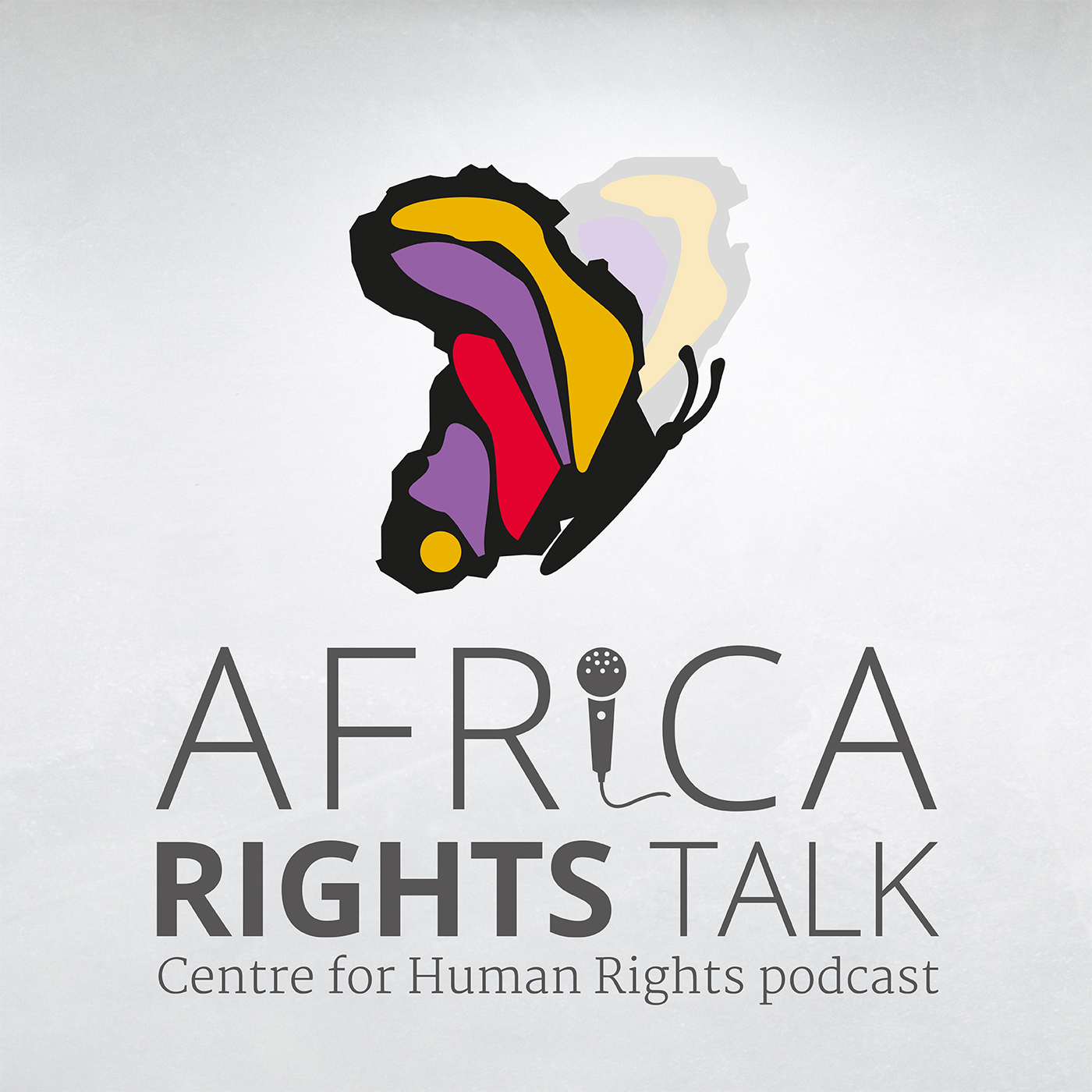Episodes
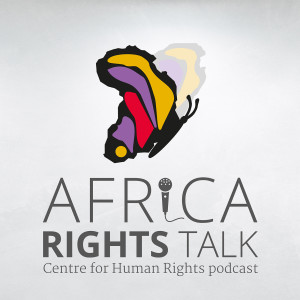
Wednesday Oct 08, 2025
S7 E12: Commemorating the 2025 International Day for Universal Access to Information
Wednesday Oct 08, 2025
Wednesday Oct 08, 2025
Academic Perspectives on Environmental Information Access in Africa
In recognition of the 2025 International Day for Universal Access to Information, the Centre for Human Rights, Faculty of Law, University of Pretoria, presents a thought-provoking podcast episode exploring the theme ‘Ensuring Access to Environmental Information in the Digital Age.’ The episode is hosted by Belinda Matore and features insights from Lassané Ouedraogo and Marie Valerie Uppiah, distinguished academics engaged in the intersection of environmental governance, human rights, and sustainable development in Africa.
The discussion examines barriers to and opportunities for enhancing access to environmental information across Africa. Lassané Ouedraogo, a PhD researcher and environmental law specialist, highlights that access to environmental information is not confined to ecological concerns alone. Rather, it is integrally connected to the protection and realisation of fundamental human rights, including the right to life. He highlights the significance of transparency and accuracy in the dissemination of environmental information to ensure that communities are adequately informed and empowered.
Echoing this view, Marie Valerie Uppiah, an expert in international trade law, law of the sea, and ocean governance, emphasises the multifaceted nature of environmental information. She illustrates how its accessibility is intrinsically linked to a broad spectrum of rights, including the rights to health, water and sanitation, and socio-economic development. She references the landmark case SERAC v Nigeria, and illustrates how legal precedents have established the essential role that environmental information plays in holding states accountable and advancing environmental justice.
Uppiah also discusses the role of Environmental Impact Assessments (EIAs) as essential tools for informing communities about the ecological implications of infrastructure projects. She cites the innovative example of MoNatir (“My Nature”), a digital platform developed in Mauritius that provides real-time information on key environmental indicators such as air quality, beach conditions, and waste management. She describes the platform as a “revolutionary” tool in facilitating public engagement and environmental awareness.
In concluding the discussion, Ouedraogo reiterates the role of communities as active agents in environmental governance. He calls for a culture of civic curiosity and public vigilance, urging communities to take initiative in seeking out information related to their environments and government-led development projects.
Speaker Biographies
Lassané Ouedraogo is the Acting Coordinator of the LLM in International Trade and Investment Law in Africa at the Centre for Human Rights, University of Pretoria.
Marie Valerie Uppiah is a Senior lecturer in International Trade Law and Law of the Sea & Ocean Governance at the University of Mauritius.

Wednesday Aug 20, 2025
S7 E9: Breaking the Silence: Women, Rights and Mental Health in Africa
Wednesday Aug 20, 2025
Wednesday Aug 20, 2025
In conversation with Bianca Knight
In honour of South Africa’s National Women’s Month, Africa Rights Talk presents “Breaking the Silence: Women, Rights, and Mental Health in Africa”, a powerful conversation exploring the overlooked but urgent intersection of gender justice and mental well-being. Across the continent, women face compounded challenges gender-based violence, poverty, systemic inequality, and cultural stigma that profoundly affect their mental health, yet these realities remain largely absent from policy and rights-based discourse.
Bianca Knight, Project Officer at the Centre for Human Rights’ Women’s Rights Unit, joins host Victoria Amaechi to unpack why mental health is not just a personal struggle but a fundamental human rights issue. Drawing from her advocacy work on the Maputo Protocol, Bianca sheds light on the cultural taboos, under-resourced systems, and generational patterns that perpetuate silence. Together, they imagine a feminist future where care, healing, and psychosocial well-being are at the heart of gender equality movements.
This candid conversation blends personal vulnerability with policy insight, challenging us to destigmatise mental health, integrate it into Africa’s women’s rights agenda, and create spaces where women can thrive, not just survive.
Bianca Knight completed her BA LLB and LLM in Multidisciplinary Human Rights at the University of Pretoria. In 2024, she obtained a Postgraduate Diploma in Business Administration from the Gordon Institute of Business Science (GIBS), and she is set to begin her MBA at Hult International Business School in Boston in September 2025. Bianca practiced as an attorney for three years before transitioning into academia and advocacy, driven by her passion for education and social justice. From 2021 to 2023, she lectured constitutional law and the law of succession at Varsity College in Pretoria. During her LLM studies, Bianca sharpened her focus on women's and children's rights, which led her to join the Centre for Human Rights at the University of Pretoria. Since 2022, she has served as a Project Officer in the Women’s Rights Unit (WRU), where she supports efforts to advance the implementation of the Maputo Protocol across Africa. Her work includes coordinating state and shadow report trainings, and
contributing to projects focused on child marriage, female genital mutilation (FGM), obstetric violence and sexual and reproductive health and rights (SRHR).
This conversation was recorded on 7 August 2025.
Youtube: https://youtu.be/MpQFogU6lns Music and news extracts: Inner Peace by Mike Chino https://soundcloud.com/mike-chinoCreative Commons — Attribution-ShareAlike 3.0 Unported — CC BY-SA 3.0 http://creativecommons.org/licenses/b...Music promoted by Audio Libraryhttps://youtu.be/0nI6qJeqFcc Limitless https://stock.adobe.com/za/search/audio?k=45259238

Tuesday Aug 19, 2025
Tuesday Aug 19, 2025
In conversation with Guy Berger
This episode of Africa Rights Talk is guest-hosted by Ivy Gikonyo from the Centre for Human Rights, who steps in for the regular host to guide an insightful conversation with Professor Guy Berger, a veteran in media freedom and digital governance, unpacks how the Africa Alliance for Access to Data was born out of election-related risks in South Africa and the urgent need to monitor online disinformation, attacks on journalists, and manipulation of public discourse. He traces the shift from access to information laws towards the demand for raw data as a public good, highlighting the dangers of opaque big tech practices, data exploitation, and Africa’s precarious position in the global artificial intelligence ecosystem. The conversation situates data at the intersection of power, accountability, and rights making clear that without robust governance, Africa risks sliding further into digital dependency and vulnerability.
But the discussion is not just about challenges; it is also about hope and action. Prof. Berger emphasizes the role of the Alliance in pushing landmark African Commission resolutions, supporting the drafting of concrete guidelines on data governance, and mobilizing a diverse ecosystem of civil society, media, academics, and regulators. With inspiring examples from Uber’s data-sharing in Lagos to resolutions mandating private sector accountability he shows how access to data can advance democracy, gender equality, consumer rights, and economic inclusion. Ultimately, the episode is a call to collective action: for Africans to reclaim agency over their data, challenge extractive global systems, and ensure that data becomes a tool for justice, empowerment, and sustainable development rather than exploitation.
Prof. Guy Berger is a South African media scholar, journalist, and former editor at the Mail & Guardian, where he was a longstanding columnist shaping public debate on media freedom and democracy. He headed the School of Journalism and Media Studies at Rhodes University, where he mentored a generation of African journalists. From 2011 to 2022, he served as Director for Freedom of Expression and Media Development at UNESCO, leading global work on internet governance, journalist safety, elections, and combating disinformation. Berger has been a Research Fellow with Research ICT Africa and continues to advise governments, civil society, and multilateral bodies on digital governance and access to information. He currently convenes the Africa Alliance for Access to Data, championing data as a public good and a foundation for democracy and human rights across the continent.
This conversation was recorded on July 31 2025.
Youtube: https://youtu.be/MpQFogU6lns Music and news extracts: Inner Peace by Mike Chino https://soundcloud.com/mike-chinoCreative Commons — Attribution-ShareAlike 3.0 Unported — CC BY-SA 3.0 http://creativecommons.org/licenses/b...Music promoted by Audio Libraryhttps://youtu.be/0nI6qJeqFcc Limitless https://stock.adobe.com/za/search/audio?k=45259238

Sunday Aug 17, 2025
S7 E10: Criminalising Solidarity: When Advocacy Becomes a Crime
Sunday Aug 17, 2025
Sunday Aug 17, 2025
In conversation with Namatai Kwekweza
In this compelling episode of Africa Rights Talk, we journey to Zimbabwe, a nation rich in culture but weighed down by political repression and shrinking civic space. Our guest, Namatai Kwekweza, a fearless pro-democracy activist and founder of WELEAD Trust, recounts her harrowing abduction and detention during the SADC summit, an ordeal rooted in her outspoken defence of constitutionalism and human rights. Despite not even being in the country at the time of the alleged offence, she continues to face trial, navigating a justice system that has denied her basic documentation and attempted to erase her movements from official records. Through her own words, Namatai exposes the machinery of state intimidation from unlawful arrests and incommunicado detention to the criminalisation of solidarity – and the toll such persecution takes on both the body and spirit.
Yet, beyond the injustice, Namatai’s story is one of unyielding defiance and hope. She speaks candidly about the personal cost of human rights work in Zimbabwe, the strategies she uses to remain resilient, and why she continues to fight for the dignity and rights of her fellow citizens despite the risks. Her testimony is a vivid reminder that in environments where power tramples freedom, individual courage can inspire collective resistance. This conversation not only sheds light on the lived realities of activists in hostile political climates but also affirms the enduring necessity of speaking truth to power.
Namatai Kwekweza is a Zimbabwean pro-democracy activist, feminist, and youth advocate. As the founder and director of WELEAD Trust, her organization focuses on empowering young people while promoting constitutionalism and human rights. With a background in diplomacy and law, Namatai is recognized for her bold leadership and disruptive thought advocacy. Her activism has garnered both national acclaim and controversy, including arrests linked to peaceful protests and her outspoken stance on government accountability.
The conversation was recorded on 12 July 2025.
Youtube: https://youtu.be/MpQFogU6lns Music and news extracts: Inner Peace by Mike Chino https://soundcloud.com/mike-chinoCreative Commons — Attribution-ShareAlike 3.0 Unported — CC BY-SA 3.0 http://creativecommons.org/licenses/b...Music promoted by Audio Libraryhttps://youtu.be/0nI6qJeqFcc Limitless https://stock.adobe.com/za/search/audio?k=45259238
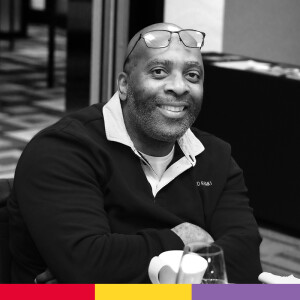
Tuesday Jul 15, 2025
Tuesday Jul 15, 2025
In conversation with Aaron Mupeti
In this episode of Africa Rights Talk, LLM in Human Rights & Democratisation in Africa (HRDA) students in the Disability Rights Unit Clinic, Joshua Nduku and Abdikarin Said engage with human rights lawyer and disability rights advocate Aaron Mupeti to unpack the challenges and possibilities for disability inclusion in South Africa. Mupeti, a wheelchair user and practicing attorney, draws from his lived experience and professional expertise to explore the meaning of true inclusion, emphasizing the need for people with disabilities to be actively involved in all aspects of society, from policy design to education and employment. He highlights the enduring infrastructural and systemic barriers faced by persons with disabilities, particularly in rural areas, and calls for a shift in societal mindset, from viewing disability through a charitable lens to embracing it as a fundamental human rights issue.
The conversation delves into the shortcomings of current policies, particularly the lack of funding, monitoring, and meaningful implementation. Mupeti critiques tokenistic employment schemes and stresses the importance of mainstreaming disability rights in legal education and public discourse. Cultural stigma, inadequate infrastructure, and weak institutional commitment continue to reproduce exclusion, he notes. Yet, he remains hopeful, outlining practical, low-cost steps such as awareness campaigns, better audits, and disability dialogues as vital starting points. Ultimately, the episode is a powerful call to action for a more inclusive, accessible, and equitable society that recognizes disability not as limitation, but as an alternative way of living.
Aaron T Mupeti is a distinguished South African attorney, disability consultant, disability rights advocate, and thought leader in public policy and human rights. Based in Johannesburg, Gauteng, he serves as the Senior Managing Director at Mupeti Attorneys and the Director of Policy and Research at the Africa Disability Initiative on Reproductive Rights (ADIRR). He is also a board member of QuadPara Association of Gauteng South (QAGS).
This conversation was recorded on 19 June 2025.
Youtube: https://youtu.be/MpQFogU6lns Music and news extracts: Inner Peace by Mike Chino https://soundcloud.com/mike-chinoCreative Commons — Attribution-ShareAlike 3.0 Unported — CC BY-SA 3.0 http://creativecommons.org/licenses/b...Music promoted by Audio Libraryhttps://youtu.be/0nI6qJeqFcc Limitless https://stock.adobe.com/za/search/audio?k=45259238
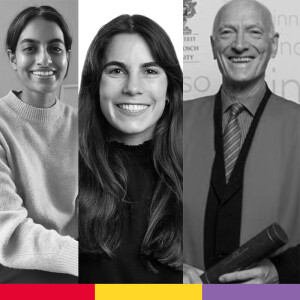
Sunday Jul 13, 2025
S7 E7: Behind Prison Walls: Unlocking a Safer South Africa
Sunday Jul 13, 2025
Sunday Jul 13, 2025
In conversation with Judge Edwin Cameron, Rebecca Gore and Sohela Surajpal
This episode of Africa Rights Talk delves into the often-invisible world of South Africa’s prison system through a compelling conversation with the authors of Behind Prison Walls: Unlocking a Safer South Africa, Judge Edwin Cameron, Rebecca Gore, and Sohela Surajpal. Drawing on their extensive experience at the Judicial Inspectorate for Correctional Services (JICS), the trio sheds light on the systemic violence, overcrowding, and lack of accountability that define life behind bars. The discussion explores the motivations behind writing the book and how it fills a critical gap in public understanding of incarceration and justice. With firsthand insights and reflections, the authors emphasize that prison reform is not just a matter of policy, but a moral imperative rooted in human rights.
The episode offers a vision for what meaningful reform could look like, centering rehabilitation, dignity, and true safety for both inmates and society at large. Judge Cameron speaks to how his prison visits reshaped his understanding of justice and vulnerability, while Gore and Surajpal share the deeply personal stories that rarely make it into the public record. Together, they argue for a collective reimagining of South Africa’s approach to correctional services, one that recognizes prisons as potential spaces of restoration rather than sites of perpetual harm. This thought-provoking episode challenges listeners to expand their understanding of justice beyond the prison walls.
Judge Edwin Cameron was appointed Inspecting Judge of prisons from 1 January 2020, after serving 25 years as a judge, the last eleven in South Africa's highest court, the Constitutional Court. He has also authored Witness to AIDS and Justice: A Personal Account.
Rebecca Gore worked as a legal researcher to Inspecting Judge Edwin Cameron at the Judicial Inspectorate for Correctional Services (2021–2022) and law clerk at the Constitutional Court of South Africa (2019-2020). In addition, she has worked and consulted for a variety of international human rights bodies in South Africa and abroad, including the UN Working Group on discrimination against women and girls. She is currently a pupil advocate at the Cape Bar. Rebecca holds a Bachelor of Social Science in Politics, Philosophy, and Economics (PPE), a postgraduate Honours degree, and an LLB from the University of Cape Town, where she is a research associate at the Centre for Law and Society. She earned her Master of Laws (LLM) from Harvard Law School, where she was awarded the Henigson Human Rights Fellowship. Her recent publications are:
- https://repository.law.umich.edu/mjgl/vol31/iss2/4/https://journals.law.harvard.edu/hrj/wp-content/uploads/sites/83/2024/06/05_HLH_37_1_Reyes-Farbstein169-206.pdf
- https://www.africanlawmatters.com/blog/carceral-period-poverty-in-south-african-prisons
Sohela Surajpal is a law clerk and researcher at the Judicial Inspectorate for Correctional Services. Sohela is an alumni of the Centre for Human Rights' Masters in Human Rights and Democratisation in Africa. She has clerked at the Constitutional Court of South Africa and worked on LGBTQ+ rights as a project officer at the Centre.
This conversation was recorded on 26 June 2025.
Youtube: https://youtu.be/MpQFogU6lns Music and news extracts: Inner Peace by Mike Chino https://soundcloud.com/mike-chinoCreative Commons — Attribution-ShareAlike 3.0 Unported — CC BY-SA 3.0 http://creativecommons.org/licenses/b...Music promoted by Audio Libraryhttps://youtu.be/0nI6qJeqFcc Limitless https://stock.adobe.com/za/search/audio?k=45259238
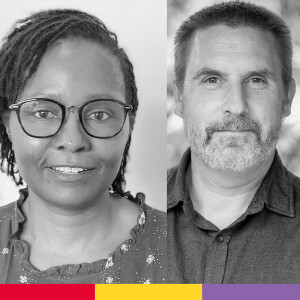
Thursday Jul 03, 2025
S7 E6: Ending Sexual Abuse Against Children
Thursday Jul 03, 2025
Thursday Jul 03, 2025
In conversation with Seán Coughlan and Dr. Joyce Wamoyi
In this episode of Africa Rights Talk, we spotlight a transformative conversation on ending childhood sexual violence (CSV) with Seán Coughlan, Director of To Zero, and Dr. Joyce Wamoyi, Tanzanian Principal Investigator for the Parenting for Lifelong Health digital programs. Together, they unpack A Vision to Zero, a groundbreaking global roadmap co-created by over 50 organizations and 330 field leaders committed to eradicating CSV. Seán discusses the importance of African-led solutions in shaping global agendas, while Joyce reflects on the powerful impact of the ParentApp Teen initiative in Tanzania, which has significantly reduced sexual violence against children through digital parenting support. Explore the A Vision to Zero Roadmap and the Toolkit for practical strategies and evidence-based interventions.
The discussion dives into the critical need to shift harmful social norms, amplify survivor voices, and foster cross-sector partnerships involving parents, civil society, and governments. Seán and Joyce explore what’s working, the systemic barriers that remain, and how young Africans and advocates can take hope and action from emerging evidence and success stories. This episode is a call to invest in locally rooted, globally relevant interventions that bring us closer to a world free from childhood sexual violence.
Seán Coughlan is a senior leader with extensive experience across both the not-for-profit and for-profit sectors. His experience includes tackling childhood sexual violence and harmful practices in his current role as Director of To Zero and previously as Executive Director of the Human Dignity Foundation. His career also includes managing Ireland's largest indigenous internet forum as Chief Executive of Boards.ie and co-founding and running Social Entrepreneurs Ireland, a sector-leading social entrepreneurship fund. Seán has also served on a number of not-for-profit and academic boards and working groups including the End Violence Against Children Safe Online Working Group, the Advisory Board of INTERPOL’s Fight Against Child Sexual Exploitation Initiative, the Board of the European Venture Philanthropy Association, the Enterprise Advisory Board of Dublin City University, the Board of Trustees of Airfield Estate farm and sustainable food hub, and the Leonardo Group of Science Gallery Dublin. Seán earned a degree in Theoretical Physics from Trinity College Dublin and is a graduate of Harvard Business School, INSEAD and the Irish Management Institute executive education programmes.
Dr. Joyce Wamoyi is a Social and Behavioural Researcher with over 20 years of research experience in adolescent and young people’s Sexual and Reproductive Health (SRH); Social determinants of health; Parenting and child outcomes; and Sexual and gender-based violence. She has contributed to the understanding dynamics of risky sexual behaviour and to the development of measures to capture complexity of risky sexual behaviour. She is the Tanzanian Lead Principal Investigator for the Parenting for Lifelong Health digital parenting programmes (ParentApp-Teens and ParentApp-Kids) to prevent violence against children. Dr. Wamoyi has excelled in translating complex research findings into actionable strategies, collaborating with national governments, civil society organizations, bilateral and philanthropic donors, and UN agencies. She is the lead of the project on building a national parenting support system for scaling evidence-based parenting interventions in Tanzania. She served as a member of the: WHO Behavioural Insights Technical Advisory Group; and UNICEF Advisory Board for the multi-country project “Children’s Experiences and Perspectives of Covid-19”. She is a co-founder of the organisation, REAL Transformation that collects evidence and transforms it into action for policy impact.
This conversation was recorded on 17 June 2025.
Youtube: https://youtu.be/MpQFogU6lns Music and news extracts: Inner Peace by Mike Chino https://soundcloud.com/mike-chinoCreative Commons — Attribution-ShareAlike 3.0 Unported — CC BY-SA 3.0 http://creativecommons.org/licenses/b...Music promoted by Audio Libraryhttps://youtu.be/0nI6qJeqFcc Limitless https://stock.adobe.com/za/search/audio?k=45259238
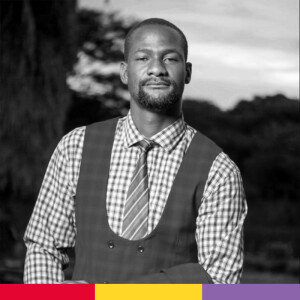
Tuesday Jun 24, 2025
Tuesday Jun 24, 2025
In conversation with Takudzwa Mharadze
In this episode of Africa Right Talk, the conversation unfolds against the backdrop of the upcoming international conference themed “Advancing Justice through Reparations: Reparations, Restoration, and Renaissance,” that was held from 2–3 June 2025 in Pretoria, South Africa. This landmark event was co-organised by the University of Pretoria, the University of Goma, the University of The Bahamas, and the Bahamas National Reparations Committee, in collaboration with key African Union human rights bodies and CARICOM. The conference brought together academics, policymakers, activists, and experts to explore strategies for reparative justice, with papers to be published in the 2025 African Human Rights Yearbook. Central to this episode is a compelling discussion with Takudzwa Mharadze, who emphasises the need for unified Africa-Caribbean action to demand reparations, restore dignity, and challenge the lingering impacts of colonialism and slavery.
Drawing on the African Union's recent designation of 2025 as the year of reparations, the speaker highlights the importance of learning from the Caribbean’s efforts, particularly CARICOM’s ten-point reparations plan. He critiques narrow, financial-only views of reparations and instead champions a broader, holistic agenda that includes debt cancellation, cultural restitution, education reform, and decolonization of knowledge. The episode underscores the necessity of building a robust, inclusive continental reparations framework, one that unites Africa and the diaspora through shared history and common purpose. The University of Pretoria and its partners are commended for their role in convening diverse voices and fostering a platform for sustained collaboration and policy influence through research, advocacy, and regional solidarity.
Takudzwa Mharadze is a PhD candidate in Development Studies at the University of Johannesburg, where he is undertaking research on Food and Nutrition Security, Adaptation and Resilience in the Context of Climate Variability in Zimbabwe: The Case of Gokwe-South District. His study critically explores the intersections of climate change, food systems, and rural livelihoods, with a focus on enhancing community resilience in vulnerable regions. Takudzwa brings over a decade of experience in development research, monitoring and evaluation, and academic and policy analysis. Throughout his career, he has engaged with diverse development themes including climate justice, disaster risk reduction, sustainable agriculture, and social protection. His practical experience spans both governmental and non-governmental sectors, where he has contributed to policy formulation, programme design, capacity building, and impact assessments. Currently serving as a part-time lecturer at the Zimbabwe Open University. T. Mharadze is an early career researcher with a strong interest in academic publishing. He is committed to contributing scholarly knowledge that bridges research, policy, and practice to address pressing socio-economic and environmental challenges in sub-Saharan Africa.
This was recorded on 2 June 2025.
Youtube: https://youtu.be/MpQFogU6lns Music and news extracts: Inner Peace by Mike Chino https://soundcloud.com/mike-chinoCreative Commons — Attribution-ShareAlike 3.0 Unported — CC BY-SA 3.0 http://creativecommons.org/licenses/b...Music promoted by Audio Libraryhttps://youtu.be/0nI6qJeqFcc Limitless https://stock.adobe.com/za/search/audio?k=45259238
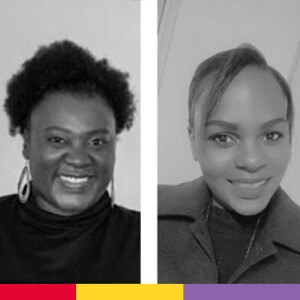
Wednesday Jun 11, 2025
S7 E4: Rethinking responsibility for child protection online
Wednesday Jun 11, 2025
Wednesday Jun 11, 2025
In conversation with Phakamile Madonsela and Belinda Matore
In this episode of Africa Rights Talk, Belinda Matore sits down with Phakamile Madonsela, from Media Monitoring Africa. The episode explores the pressing issue of online harms faced by children in South Africa and the continent more broadly. Drawing from her work at Media Monitoring Africa, Madonsela outlines the dual nature of the digital world—highlighting both its potential for connectivity, education, and self-expression, and its darker side, including cyberbullying, child sexual abuse material, and online stalking. She stresses the importance of equipping young people with digital literacy and the tools to become responsible digital citizens while also emphasizing the need for inclusive, rights-based digital participation frameworks.
Phakamile highlights the interplay between personal responsibility, institutional duty, and systemic influence also speaks to the important role of the state and digital platforms in safeguarding children's rights online. While much responsibility has traditionally been placed on parents, often without sufficient regard to their digital literacy or social context, the state remains the primary duty bearer in upholding children’s rights. Through enforceable legislation, such as South Africa’s POPIA (Protection of Personal Information Act), the state is empowered to set the rules by which tech companies must operate. Yet, the interview highlighted how inconsistencies in enforcement allow global platforms like Instagram and TikTok to offer less protection to children in South Africa than in Europe. This disparity reflects a need for stronger state-led regulation and enforcement to ensure equal digital protection.
Phakamile Madonsela is a dedicated advocate for the protection and promotion of children's rights in the media, specializing in children's rights, media, and digital advocacy. At MMA,she leads critical projects that advance child participation and digital rights within the African context, with a particular emphasis on creating safe, inclusive digital spaces for young people. Her expertise centers on the intersection of human rights, internet governance, and children's digital rights, with a passion for child participation in democratic processes. Notably, she was listed in the Mail & Guardian 200 Young South Africans in 2019 and selected for the DGMT Innovation Fellowship in 2024, and is currently pursuing a Masters degree in Multidisciplinary Human Rights to further advance her work in child participation and digital rights within the African context.
Belinda Matore is a passionate advocate for children's rights in the digital age, with a special focus on online child protection, digital rights and legal technology. As a Doctor of Laws (LLD) candidate at the University of Pretoria, her research explores legal technology, regulatory compliance, and digital governance, all through the lens of safeguarding children in digital spaces. In her role as Project Officer at the Expression, Information, and Digital Rights (EIDR) Unit, Belinda leads work that strengthens freedom of expression, access to information, digital rights and child safety frameworks within the African context. Her work is driven by a commitment to shaping policies that uphold children’s rights online and empower their participation in digital society. She was recently featured in Legal Africa Magazine for her contributions to the field of digital law and child protection.
This conversation was recorded on 4 June 2025.
Youtube: https://youtu.be/MpQFogU6lns Music and news extracts: Inner Peace by Mike Chino https://soundcloud.com/mike-chinoCreative Commons — Attribution-ShareAlike 3.0 Unported — CC BY-SA 3.0 http://creativecommons.org/licenses/b...Music promoted by Audio Libraryhttps://youtu.be/0nI6qJeqFcc Limitless https://stock.adobe.com/za/search/audio?k=452592386
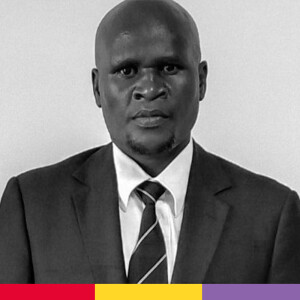
Monday Jun 09, 2025
Monday Jun 09, 2025
In conversation with Dr. Dennis Wamalwa
In this episode of the Africa Rights Talk Podcast, Dr. Dennis Wamalwa joins the conversation during a NANHRI training held in Pretoria from April 10 to 11, 2025. The training focused on strengthening the capacity of African National Human Rights Institutions (NHRIs) in the protection and promotion of the rights of intersex persons. Dr. Wamalwa, a leading human rights advocate and academic, shares key reflections on the role of NHRIs in addressing the systemic invisibility, stigma, and discrimination faced by intersex persons across the continent. He discusses the necessity of aligning institutional practices with human rights standards and the importance of integrating intersex issues into broader national human rights agendas.
Drawing on insights from the training, Dr. Wamalwa emphasizes the need for capacity building that goes beyond technical knowledge to include empathy, cultural sensitivity, and legal reform. He highlights how African Commission Resolution 552 serves as a critical framework for guiding NHRIs in their mandate to protect intersex persons, who are often marginalised due to deeply rooted social and medical norms. The conversation underscores the urgency of institutional accountability, inclusive policy development, and sustained advocacy to ensure intersex persons are not left behind in the human rights discourse. The episode serves as a compelling call for action, urging NHRIs and civil society actors to work collaboratively in transforming awareness into tangible protections for intersex individuals in Africa.
Dr. Dennis Wamalwa is a Kenyan human rights leader and the first openly intersex person to be appointed as a Commissioner of the Kenya National Commission on Human Rights (KNCHR) in February 2022. He holds a PhD in Peace and Conflict Studies and is a university lecturer. Dr. Wamalwa has become a powerful advocate against discrimination toward intersex persons. He delivered candid testimony before Kenya’s Justice and Legal Affairs Committee, outlining his experiences of rights violations based on his identity. As Commissioner, he champions legal reforms such as Kenya’s inclusion of intersex status in the 2019 census and 2022 Children’s Act, and continues to push for stronger protection frameworks, public awareness, and policy implementation to ensure recognition, dignity, and equal rights for intersex individuals across Kenya and Africa.
This conversation was recorded on 11 April 2025.
Youtube: https://youtu.be/MpQFogU6lns Music and news extracts: Inner Peace by Mike Chino https://soundcloud.com/mike-chinoCreative Commons — Attribution-ShareAlike 3.0 Unported — CC BY-SA 3.0 http://creativecommons.org/licenses/b...Music promoted by Audio Libraryhttps://youtu.be/0nI6qJeqFcc Limitless https://stock.adobe.com/za/search/audio?k=452592386

